Consumer Protection Act
Consumer Protection Act. Objectives. It was enacted after in-depth study of consumer protection laws in a number of countries and in consultation with representatives of consumers, trade and industry and extensive discussions within the Government.
Share Presentation
Embed Code
Link
Download Presentation
- district forum
- union territory administrations
- bargain price
- detailed definition
- comprehensive piece
- unscrupulous exploitation

reegan + Follow
Download Presentation
Consumer Protection Act
An Image/Link below is provided (as is) to download presentation Download Policy: Content on the Website is provided to you AS IS for your information and personal use and may not be sold / licensed / shared on other websites without getting consent from its author. Content is provided to you AS IS for your information and personal use only. Download presentation by click this link. While downloading, if for some reason you are not able to download a presentation, the publisher may have deleted the file from their server. During download, if you can't get a presentation, the file might be deleted by the publisher.
Presentation Transcript
- Consumer Protection Act
- Objectives It was enacted after in-depth study of consumer protection laws in a number of countries and in consultation with representatives of consumers, trade and industry and extensive discussions within the Government. The consumer protection Act, 1986 is a milestone in the history of socio-economic legislation in the country. It is one of the most progressive and comprehensive piece of legislations enacted for the protection of consumers.
- The main objective of the act is to provide for the better protection of consumers. Unlike existing laws which are punitive or preventive in nature, the provisions of this Act are compensatory in nature. • The act is intended to provide simple, speedy and inexpensive redressal to the consumers' grievances, and relief's of a specific nature and award of compensation wherever appropriate to the consumer. The act has been amended in 1993 both to extend its coverage and scope and to enhance thepowers of the redressal machinery.
- Definitions • “Goods" means goods as defined in the State of Goods Act, 1930 • According to the Sale of Goods Act, 1930. "goods" means every kind of movable property other than actionable claims and money, and includes stock and shares, growing crops, grass, and this attached to or forming part of the land which are agreed to be served before sale or under the contract of sale. • “Service" means service of any description which is made available to potential users.
- These includes the provision of facilities in connection with banking, financing, insurance, transport, processing, supply of electrical or other energy, board or lodging or both, housing construction, entertainment, amusement or the purveying of news or other information, but does not include the rendering of any service free of charge or under a contract of personal service. • “Defect" means any fault, imperfection or shortcoming in the quality, quantity, potency, purity or standard which is required to be maintained by or under any law for the time being in force or under any contract express or implied or as is claimed by the trader in any manner whatsoever in relation to any goods.
- “Deficiency" means any fault, imperfection, shortcoming or inadequacy in the quality, nature and manner of performance which is required to be maintained by or under any law for the time being in force or has been undertaken to be performed by a person in pursuance of a contract or otherwise in relation to any service. • “Restrictive trade practice" means any trade practice which requires a consumer to buy, hire or avail of any goods or, as the case may be, services as a condition precedent for buying, hiring or availing of other goods or services;
- “Unfair trade practice" the detailed definition is given in the Consumer Protection Act, 1986 as amended by the Consumer Protection (Amendment) Act. 1993. It means a trade practice which, for the purpose of promoting the sale, use or supply of any goods or for the provision of any service, adopts any unfair method or unfair or deceptive practice including any of the following practices, namely :- (a) False or misleading representation, (b) Bargain price (c) Offering of gifts, prize, contest etc. (d) Non compliance of product safety standard. (e) Hoarding or destruction of goods.
- Extent and Coverage of the Act The salient features of the Act are summed up as under:- • The Act applies to all goods and services unless specifically exempted by the Central Government. • It covers all the sectors whether private, public or cooperative. • The provisions of the Act are compensatory in nature. It includes the following rights of consumers:- • Right to be protected against the marketing of goods and services which are hazardous to life and property.
- Right to be informed about the quality, quantity, potency, purity, standard and price of goods or services so as to protect the consumer against unfair trade practices • Right to be assured , wherever possible , access to a variety of goods and services at competitive prices; • Right to be heard and to be assured that consumers' interests will receive due consideration at appropriate forums; • Right to seek redressal against unfair trade practices unscrupulous exploitation of consumers; and • Right to consumer education
- Who is a Consumer? • All of us are consumers of goods and services. For the purpose of the Consumer Protection Act,the word "Consumer" has been defined separately for "goods" and "services". For the purpose of "goods", a consumer means a person belonging to the following categories: • One who buys or agrees to buy any goods for a consideration which has been paid or promised or partly paid and partly promised or under any system of deferred payment • It includes any user of such goods other than the person who actually buys goods and such use is made with the approval of the purchaser
- For the purpose of "services", a "consumer" means a person belonging to the following categories: • One who hires or avails of any service or services for a consideration which has been paid or promised or partly paid and partly promised or under any system of deferred payment; • It includes any beneficiary of such service other than the one who actually hires or avails of the service for consideration and such services are availed with the approval of such person.
- Who can file a complaint? • The following can file a complaint under the Act:- • A consumer • Any voluntary consumer organization registered under the Societies Registration Act,1860 or under the Companies Act,1956 or under any other law for the time being in force. • The Central Government • The State Government or Union Territory Administrations. • One or more consumers on behalf of numerous consumers who are having the same interest
- What constitutes a complaint? • Under the Act, a complaint means any allegation in writing made by a complainant in regard to one or more of the following:- • Any unfair trade practice as defined in the Act or restrictive trade practices like tie-up sales adopted by any trader. • One or more defects in goods. The goods hazardous to life and safety, when used, are being offered for sale to public in contravention of provisions of any law for the time being in force.
- Deficiencies in services • A trader charging excess of price. • Fixed by or under any law for the time being in force; or • Displayed on goods; or • Displayed on any packet containing such good
- Where to file a complaint? • If the cost of goods or services and compensation asked for is up to rupees twenty five lakh ,then the complaint can be filed in the District Forum which has been notified by the State Government for the district where the cause of action has arisen or where the opposite party resides. • A complaint can also be filed at a place where the branch office of the opposite party is located. • If the cost of goods or services and compensation asked for is more than twenty rupees five lakh , but less than rupees one crore then the complaint can be filed before the State Commission notified by the State Government or Union Territory. • If the cost of goods or services and compensation asked for exceed rupees one crore then the complaint can be filed before the National Commission at New Delhi.
- How to file a complaint? Procedures for filing complaints and seeking redressal are simple. • There is no fee for filing a complaint before the District Forum, the State Commission or the National Commission. (A stamp paper is also not required) There should be 3 to 5 copies of the complaint on plain paper. • The complainant or his authorized agent can present the complaint in person. • The complaint can be sent by post to the appropriate Forum / Commission.
- A complaint should contain the following information • The name, description and the address of the complainant. • The name , description and address of the opposite party or parties, as the case may be, as far as they can be ascertained; • The facts relating to complaint and when and where it arose; • Documents, if any, in support of the allegations contained in the complaint. • The relief which the complainant is seeking. • The complaint should be signed by the complainant or his authorized agent. • The complaint is to be filed within two years from the date on which cause of action has arisen.
- Relief available to the consumers Depending on the nature of relief sought by the consumer and facts, the Redressal Forums may give orders for one or more of the following relief's:- • Removal of defects from the goods, • Replacement of the goods; • Refund of the price paid; • Award of compensation for the loss or injury suffered; • Removal of defects or deficiencies in the services; • Discontinuance of unfair trade practices or restrictive trade practices or direction not to repeat them; • Withdrawal the hazardous goods from being offered to sale.
- Composition of the District Forum (1) Each District Forum shall consist of, - (a) a person who is, or has been, or is qualified to be a District Judge, who shall be its President; (b) two other members, who shall be persons of ability, integrity and standing, and have adequate knowledge or experience of, or have shown capacity in dealing with, problems relating to economics, law, commerce, accountancy, industry, public affairs or administration, one of whom shall be a woman.
- Jurisdiction of the District • (1) the District Forum shall have jurisdiction to entertain complaints where the value of the goods or services and the compensation, if any, claimed does not exceed rupees twenty five lakhs. • (2) A complaint shall be instituted in a District Forum within the local limits of whose jurisdiction, - • (a) the opposite party or each of the opposite parties, at the time of the institution of the complaint, actually and voluntarily resides or carries on business; or • (b) any of the opposite parties, at the time of the institution of the complaint, actually and voluntarily resides, or carries on business or, as the case may be, acquiesce in such institution; or • (c) the cause of action, wholly or in part, arises.
- Composition of the State Commission Each State Commission shall consist of – • a person who is or has been a Judge of a High Court, appointed by the State Government after consultation with the Chief Justice of the High Court, who shall be its President; (b) two other members, who shall be persons of ability, integrity and standing and have adequate knowledge or experience of, or have shown capacity in dealing with problems relating to economics, law, commerce, accountancy, industry, public affairs or administration, one of whom shall be a woman and that every appointment shall be made on the recommendation of a selection committee consisting of the following, namely
- President of the State Commission - Chairman, (ii) Secretary of the Law Department of the State - Member, (iii) Secretary, in-charge of Department dealing with consumer affairs in the State - Member. (3) Every member of the State Commission shall hold office for a term of five years or up to the age of sixty-seven years, whichever is earlier and shall not be eligible for re-appointment.
- Jurisdiction of the State commission Subject to the other provisions of this Act, the State Commission shall have jurisdiction – (a) to entertain – (i) complaints where the value of the goods or services and compensation, if any, claimed exceeds rupees twenty five lakhs but does not exceed rupees one crore; and (ii) appeals against the orders of any District Forum within the State; and
- (b) to call for the records and pass appropriate orders in any consumer dispute which is pending before or has been decided by any District Forum within the State • where it appears to the State Commission that such District Forum has exercised a jurisdiction not vested in it by law, or • has failed to exercise a jurisdiction so vested or has acted in exercise of its jurisdiction illegally or with material irregularity.
- Composition of the National • (1) The National Commission shall consist of - • (a) a person who is or has been a Judge of the Supreme Court, to be appointed by the Central Government after consultation with the Chief Justice of India, who shall be its President : • (b) four other members who shall be persons of ability, integrity and standing and have adequate knowledge or experience of, or have shown capacity in dealing with, problems relating to economics, law, commerce, accountancy, industry, public affairs or administration, one of whom shall be a woman.
- Every appointment shall be made by the Central Government on the recommendation of a selection committee consisting of the following, namely - (a) a person who is a Judge of the Supreme Court to be nominated by the Chief Justice of India - Chairman, (b) the Secretary in the Department of Legal Affairs in the Government of India - Member, (c) Secretary of the Department dealing with consumer affairs in the Government of India - Member. (3) Every member of the National Commission shall hold office for a term of five years or up to the age of seventy years, whichever is earlier and shall not be eligible for re-appointment.
- Jurisdiction of the National Commission • Subject to the other provisions of this Act, the National Commission shall have jurisdiction – • (a) to entertain – • (i) complaints where the value of the goods or services and compensation, if any, claimed exceeds rupees twenty lakhs; and • (ii) appeals against the orders of any State Commission; and
- (b) to call for the records and pass appropriate orders in any consumer dispute which is pending before or has been decided by any State Commission • where it appears to the National Commission that such State Commission has exercised a jurisdiction not vested in it by law, or • has failed to exercise a jurisdiction so vested, or • has acted in the exercise of its jurisdiction illegally or with material irregularity

CONSUMER PROTECTION ACT (CPA / COPRA)
CONSUMER PROTECTION ACT (CPA / COPRA). dr shabeel pn. INTRODUCTION. CHARAKA’S OATH :
891 views • 54 slides

CONSUMER PROTECTION ACT
CONSUMER PROTECTION ACT. Consumer Protection Act. Enacted by the Parliament in 1986 To provide for better protection of interest of consumers. To make provisions for the establishment of Consumer Councils and other authorities for the settlement of consumer disputes. Who is a Consumer?.
1.02k views • 22 slides

CONSUMER PROTECTION ACT
CONSUMER PROTECTION ACT. Dr. Don Gregory Junior Resident Dept of Chest & TB. I ntroduction.
812 views • 49 slides

THE CONSUMER PROTECTION ACT, 1986
THE CONSUMER PROTECTION ACT, 1986. PROF NEHA SAJNANI. CONSUMER. S.2 (1) (d) : Any Person who. Buys any Goods. Hires/Avails of any Service. For a consideration which has been paid / promised / partly paid / partly promised or under any system of deferred payment & includes.
1.3k views • 22 slides

Consumer Protection Act
Consumer Protection Act. Objects of the Act. Better protection of consumer interests Protection of consumer rights – hazardous nature, quality quantity, price, to be heard, redressal, consumer education Consumer protection council Quasi judicial. Unfair trade practice.
845 views • 14 slides

Consumer Protection Act, 1986
Consumer Protection Act, 1986.
1.85k views • 25 slides
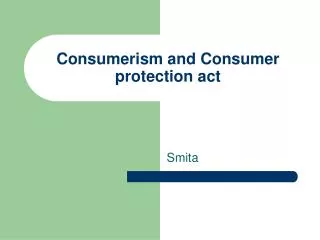
Consumerism and Consumer protection act
Consumerism and Consumer protection act. Smita. What is Consumerism?.
775 views • 17 slides
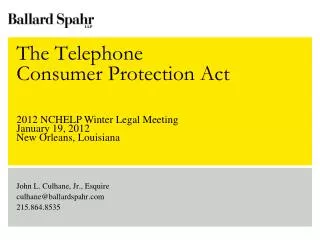
The Telephone Consumer Protection Act
The Telephone Consumer Protection Act . 2012 NCHELP Winter Legal Meeting January 19, 2012 New Orleans, Louisiana. John L. Culhane, Jr., Esquire culhane@ballardspahr.com 215.864.8535. The Telephone Consumer Protection Act. General Overview Select Legislative Developments
307 views • 7 slides
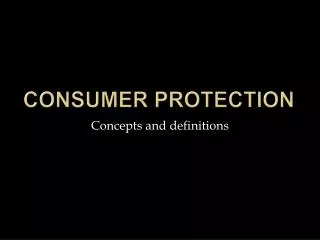
Consumer Protection Act- Akosha
An Act to provide for better protection of the interests of consumers and for that purpose to make provision for the establishment of consumer councils and other authorities for the settlement of consumers' disputes and for matters connected therewith. Akosha.com is online consumer forum which help consumers to resolve theri complaints.
463 views • 14 slides

The Telephone Consumer Protection Act
The Telephone Consumer Protection Act. Presented by: Raymond F. Moats, Esq. February 27, 2014. Overview. Telephone Consumer Protection Act of 1991 Fair Debt Collection Practices Act. TPCA . 47 U.S.C. §227 Do Not Call Implementation Act Regulations: 47 C.F.R. §64.1200
618 views • 30 slides

CONSUMER PROTECTION ACT, 1986
CONSUMER PROTECTION ACT, 1986. CONSUMER PROTECTION ACT, 1986. Enacted to provide for the better protection of the interest of consumer Act applies to whole of India except Jammu and Kashmir The act was amended in 2002 and the amendments came into force w.e.f. 15 th March 2003.
808 views • 22 slides

CONSUMER PROTECTION ACT,1986
CONSUMER PROTECTION ACT,1986. ISSUES, CHALLENGES & POSSIBLE SOLUTIONS. Dr. R. K. Sharma Assistant Professor Dept. of Hosp. Admin. PGIMER Chandigarh. Assisted by Dr Jitender Sodhi. PLAN OF PRESENTATION. Introduction Milestones Brief description of CPA,1986
5.27k views • 112 slides
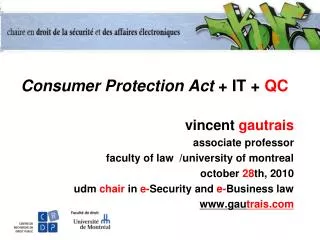
Consumer Protection Act + IT + QC
Consumer Protection Act + IT + QC. vincent gautrais associate professor faculty of law /university of montreal october 28 th, 2010 udm chair in e- Security and e- Business law www.gau trais.com. je me souviens … remember …. que né sous le lys … that born under the lily ….
1.25k views • 108 slides

CONSUMER PROTECTION ACT, 1986
CONSUMER PROTECTION ACT, 1986. CONSUMER PROTECTION ACT, 1986.
862 views • 12 slides

Consumer Protection Act -1986
Consumer Protection Act -1986. Introduction. Caveat emptor rule ( let the buyer beware) in sale of goods act of 1930, sprout the root of consumer interest protection. United nations passed resolution of consume protection in april 1985 In India 1986 was the enactment of consumer protection act
2.94k views • 67 slides

CONSUMER PROTECTION ACT 1986
CONSUMER PROTECTION ACT 1986. PRESENTATION BY: Kratika Saxena MBA: MM 3 rd sem. AN INTRODUCTION.
2.29k views • 25 slides

CONSUMER PROTECTION ACT & MEDICAL NEGLIGENCE
CONSUMER PROTECTION ACT & MEDICAL NEGLIGENCE. ACT AND PRACTICE OF PATHOLOGY. Know thy law. Tort Contract Consumer Protection Law Civil Courts Tribunal – Consumer Fora. CONSUMER PROTECTIN ACT. AN ADDITIONAL REMEDY A BENEFICIARY LEGISLATION
482 views • 40 slides

Consumer Protection Act, 1986
Consumer Protection Act, 1986. Goods & Services. Objects of the Act. Right to be protected against marketing of goods which are hazardous to life and property.
1.38k views • 22 slides
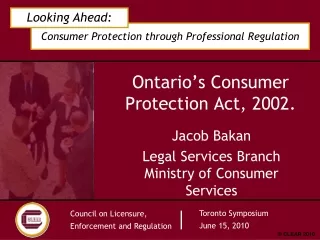
Ontario’s Consumer Protection Act, 2002.
Ontario’s Consumer Protection Act, 2002. Jacob Bakan Legal Services Branch Ministry of Consumer Services. Consumer Protection Act, 2002. Consumer Protection Act, 2002 (“CPA”) is law of general application. Applies to “consumer transactions” with “consumers”.
328 views • 20 slides

The Telephone Consumer Protection Act
The Telephone Consumer Protection Act. 2012 NCHELP Winter Legal Meeting January 19, 2012 New Orleans, Louisiana. John L. Culhane, Jr., Esquire culhane@ballardspahr.com 215.864.8535. The Telephone Consumer Protection Act. General Overview Select Legislative Developments
104 views • 7 slides

CONSUMER PROTECTION ACT, 1986
CONSUMER PROTECTION ACT, 1986. ( With amendments of the Act effected from 15.3.2003 and rules from 5.3.2004). CONSUMER PROTECTION ACT, 1986. Enacted to provide for the better protection of the interest of consumer Act applies to whole of India except Jammu and Kashmir
664 views • 34 slides























